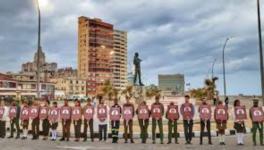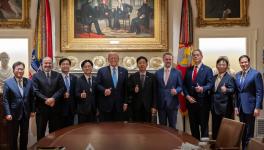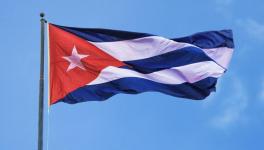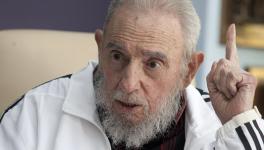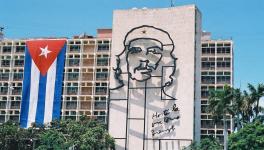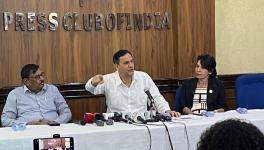After Covid-19, We Should All Be Cuba
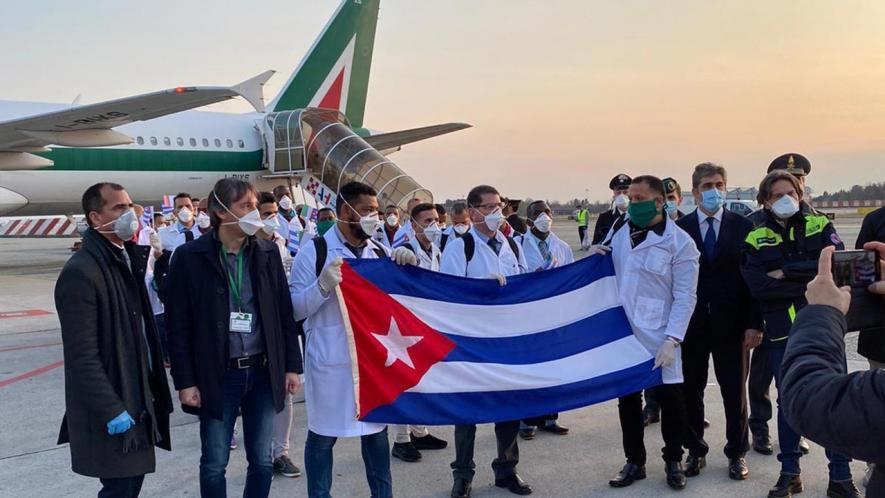
Image Courtesy: Malpensa airport website
Rare are those photographs which can be declared iconic right after they are taken, without awaiting the approval of the connoisseurs, critics or people. It is an ordinary-looking photo, of a large team of people, dressed in white robes, disembarking from a plane and being welcomed by someone wearing a white coat too. Take a closer look at the frame and you will note a mood of jubilation among the people who are watching them from the airport’s lounge.
The photo is of Malpensa airport at Milan, an alpha-global city recognised so far as one of the world’s four fashion capitals and the capital of North Italy’s Lombardy region. Today, it has also come to be known as a hotspot of Covid-19 infections, a site where thousands have died of the infection. The picture we are talking about is of 52 doctors and nurses from Cuba who arrived in Italy on invitation from the regional Italian minister of health and welfare, Giulio Gallera.
Italy, ironically, has been party for a long time to the economic sanctions imposed by the United States on this tiny Caribbean nation with a population of around 1 crore (10 million). The sanctions have been declared “illegal” by the United Nations time and again. But the anti-humanitarian attitude of the Italian ruling classes could not stop Cuba from sending its medical team there to combat Covid-19. Media reports tell us that Italy happens to be the sixth country—after Venezuela, Nicaragua, Jamaica, Suriname and Grenada—on the current itinerary of Cuban medical teams flying around to fight the pandemic.
As the world battles the pandemic, the “mighty ones” are finding themselves at a loss. Even the US President Donald Trump has felt compelled to change his tone and accept that the death toll from Covid-19 could quickly cross almost a quarter of a million. He has warned Americans to prepare for a “very, very painful two weeks.” US hospitals are overloaded with patients and running out of essential equipment such as PPEs, ventilators and masks. The rapaciousness and cruelty of the corporates and money-bags is a strong contrast to the tiny island nation at the forefront of combating the global crisis. Today, and not for the first time, Cuba is winning international praise for extended support to humanity. This effort by Cuban doctors is a fine example of what Fidel Castro used to call “medical internationalism”.
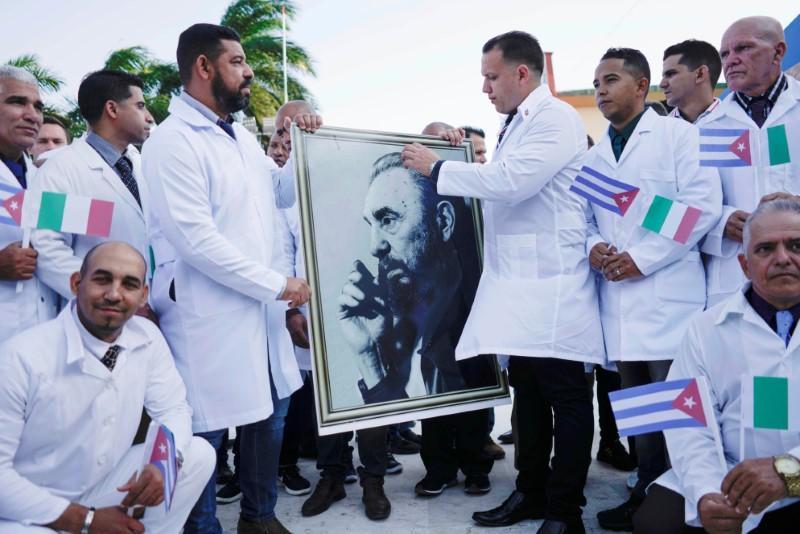
Image Courtesy: Reuters
Passengers aboard a British cruise ship stranded for more than a week in the Caribbean—because there had been a surge of Novel Coronavirus cases on board and no country was allowing them to disembark—were recently allowed to disembark in Cuba from where they flew home. The hawks in the US establishment definitely must have seen the photograph—and felt a surge of rage—of the passengers carrying banners that read “I Love Cuba”.
Reuters said of the incident: “Communist-run Cuba offered a safe haven to the Braemar at the request of the British government after several other Caribbean island nations—including Barbados and the Bahamas, which belong to the British Commonwealth—declined to let it dock.”
The “Cuban miracle” is exceptional for holding health as a basic human right for all and creating a system which takes care of the sick. It has transformed the goal of medicine into “privileging the promotion of a healthy community, investment in health literacy and promotion of healthy lifestyles.” The roots of Cuba’s miracle lie in how Castro and his comrades, who led the Cuban revolution in 1959, envisaged fundamental changes in existing health systems and decided to put people at the centre. The new system created the family doctor-and-nurse programme which ensured that every neighbourhood had primary healthcare.
It is a measure of this system’s successes that infant mortality rate in Cuba is 4.2 per 1,000—the lowest in Latin America and even lower than in the US—even though its per-capita healthcare expenditure is a fraction of what the US spends. Cuban medical scientist’s success in developing “cutting-edge measures to combat diseases ranging from meningitis to cancers” is the other end of this spectrum.
Dr Helen Yaffe, author of We Are Cuba! How A Revolutionary People Have Survived in a Post-Soviet World and a professor at Glasgow University, has detailed how Cuba has developed drugs for Covid-19 treatment and vaccine development. She narrates the history of Cuba’s so-called Army of White Coats, which has visited disaster sites around the world, largely in poor countries, since the 1959 revolution. Cuban doctors were also on the front-lines of the fight against “cholera in Haiti and against Ebola in West Africa in the 2010s.”
Cuba’s Foreign Affairs Ministry’s data tells that since the 1960s more than 6,00,000 Cuban medical professionals have been sent to over 160 countries. In 2018, approximately 55,000 Cuban medical specialists were working in 67 countries. It has also trained tens of thousands of other professionals from marginalised regions.
The Covid-19 pandemic has brought into sharp focus the achievements of a little Caribbean island in the field of global healthcare, but it has also exposed the ruling elite of the West, who have “blood on its hands” for cutting funding for their own healthcare.
The ‘leaders of the free world’, including the United Kingdom, refused to act to save their people and their healthcare system despite having “extensive prior knowledge of the National Health Services’ catastrophic failings when it tested, in 2016, its ability to combat a novel virus pandemic. Sources in the governments of these countries, including the UK, are now admitting that their ‘austerity’ measures after 2008 and cuts to their public health services “resulted in preventable deaths”.
Theresa May’s Conservative government and the health authorities had held “Exercise Cygnus” in 2016 to assess the country’s readiness for a novel respiratory influenza pandemic. Its results were never made public because, according to The Telegraph, the findings were deemed “too terrifying” to be revealed. The government understood, no doubt, that correcting the situation would require a complete overhaul of how Tories were engaged in squeezing funding for the NHS. A former government source declares the mood in which these cuts were made despite strong opposition from doctors and the public: “Throwing money at the problem was not necessarily the solution. The NHS eats up money. It’s a bottomless pit … We were in a time of austerity and it wasn’t easy.”
This warning for a possible pandemic was not limited to the UK only. Noam Chomsky explains in his recent interview to Truthout, “Scientists have been warning of a pandemic for years, insistently so since the SARS epidemic of 2003, also caused by a coronavirus, for which vaccines were developed but did not proceed beyond the pre-clinical level.” According to him, neither was any rapid response system put in place to prepare for an outbreak, nor were initiatives taken to develop defences. That option, Chomsky says, “was barred by the pathology of the contemporary socio-economic order. Market signals were clear: There’s no profit in preventing a future catastrophe.”
No doubt this pandemic has suddenly exposed to the world what Chomsky calls “neo-liberal brutality” of the unconstrained capitalist order and the “twisted form markets it constructs”.
Today even the US spends hundreds of billions of dollars to purchase advanced weapon systems to remain engaged in multiple wars, but does not have the monies to provide its hospitals with ventilators or protective gear to its doctors and health workers exposed to the virus. The pandemic is in full bloom now, but once it subsides there must be a rethinking. The chattering classes of the ‘free world’ should know that it is their consistent brutal assaults on the social right to healthcare that has played havoc with the lives of people and led to thousands of “preventable deaths”. And Cuba will still have more lessons to offer.
The author is an independent journalist. The views are personal.
Get the latest reports & analysis with people's perspective on Protests, movements & deep analytical videos, discussions of the current affairs in your Telegram app. Subscribe to NewsClick's Telegram channel & get Real-Time updates on stories, as they get published on our website.









